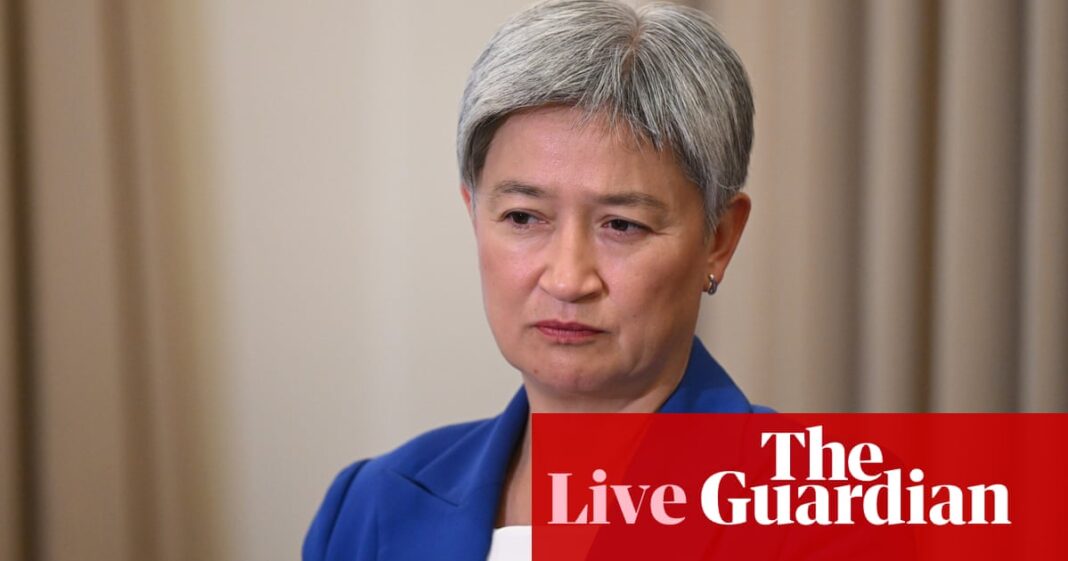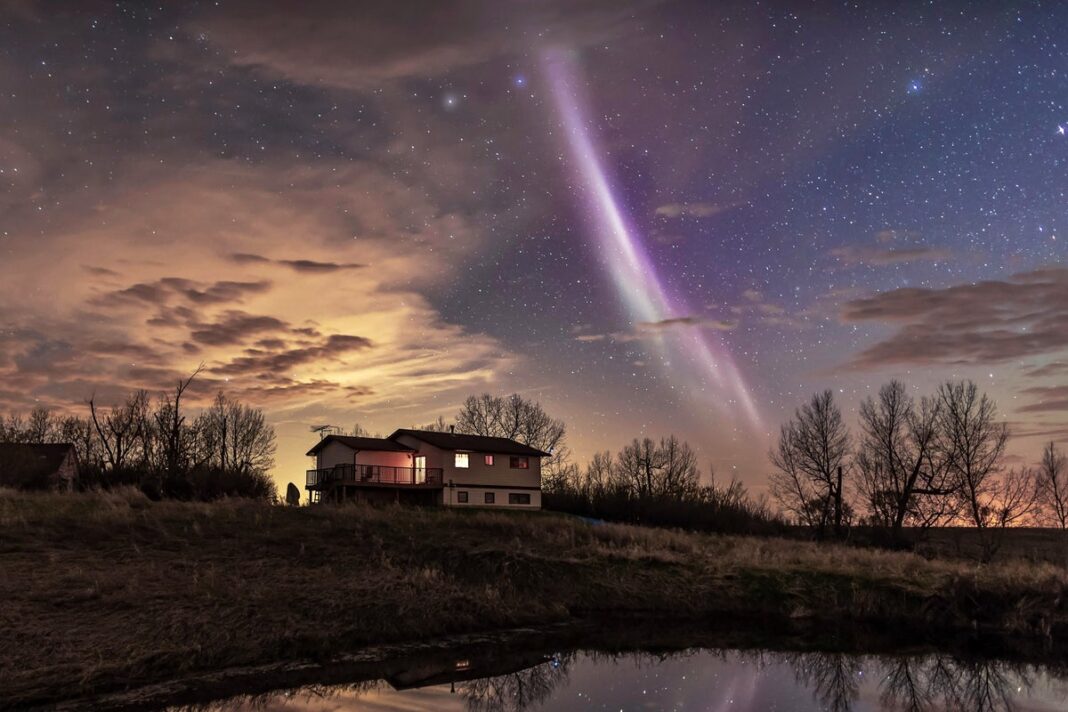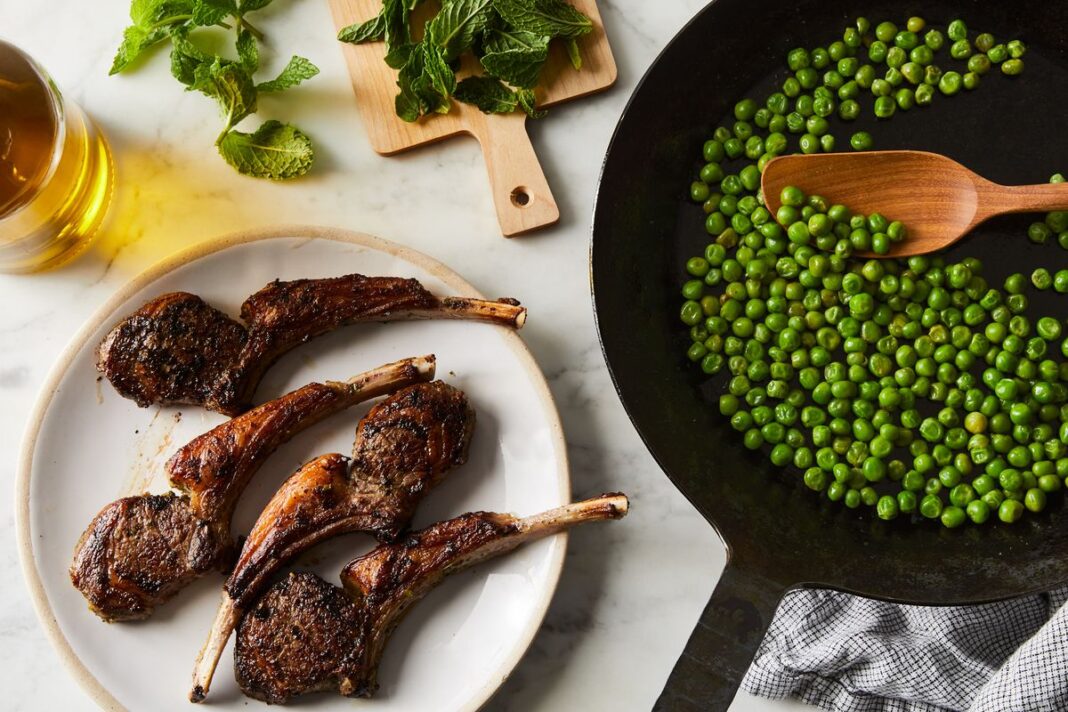Wong dismisses Dutton over ‘captain obvious’ suggestions for tariff response
The foreign minister, Penny Wong, says the US administration’s tariffs are a “poor decision”.
Wong is asked on Sky News to respond to Peter Dutton’s suggestion that there is a pathway to resolving the issues if there’s a “will”.
Wong calls Dutton “captain obvious”, suggesting the government is doing everything he’s pointed out already, and called him “reckless”.
Peter Dutton seems to think he’s Superman, but he’s actually Captain Obvious. He suggests that this is a time for negotiation, well, that is what we have been doing. He suggests we should be discussing critical minerals, I’m sure he will recall it’s quite been quite public, that is, that is what we have been doing …
But really, what we saw from Mr Dutton today is more reckless arrogance. We saw him today talking down Australia.
Wong says, as she mentioned during her press conference with the prime minister, that this is a time for unity across politics, and warns Dutton to “stop his relentless carping”.
Key events
Dutton is tested again on what exactly he would put on the table in negotiations with the Trump administration.
One reporter asks whether Australians even want a fight with the US? Dutton replies:
Well, you bet that we’re going to get the best deal for our country, and we can do that through strong leadership.
He’s asked whether a Dutton government would be willing to withhold assets or from the US, but Dutton says his approach would be the “opposite”.
It’s about what we can bring to the table in a bigger deal with the United States, I think there is opportunity for us to take what is a bad decision and decision I’m dead against that’s been made by the President.
There’s huge market opportunity in the US, the critical mineral development out of WA can supply the US supply chain, and we can have assurances, because we’re a trusted partner, there is enormous opportunity. But the Prime Minister hasn’t spoken about any of that to President Trump…
Again, the Albanese has said that the government did negotiate with the Trump administration on critical minerals after the first set of tariffs on steel and aluminium were announced. (You can recap that here).
Dutton is asked point blank by another reporter if there is a “stick” that can be used against the US.
He doesn’t directly answer the question, he just says the US “value the relationship we have with them”.
Peter Dutton is speaking to media again from Perth, and he’s pushing hard on mining (specifically that the coalition heavily supports the mining industry).
Dutton has accused Labor of delaying a decision on the extension of the North West shelf gas project in WA.
I think what it says to everybody in WA who is reliant on or connected with this sector, with this incredible mining sector, that you can’t trust Mr Albanese, and he certainly can’t trust a minority labor greens government.
The first question to Dutton goes to whether a Coalition government would repeal the same job, same pay IR laws that the Labor government has put in.
Dutton goes straight to what he’s said previously, that he’ll deregister the construction union, the CFMEU, which is currently under administration.
The big difference on industrial relations policy at the next election between us and the Labor Party will be that we’re going to deregister the CFMEU. The CFMEU would be a disaster for the Pilbara. The CFMEU would be a disaster across every mining site.
Wong dismisses Dutton over ‘captain obvious’ suggestions for tariff response
The foreign minister, Penny Wong, says the US administration’s tariffs are a “poor decision”.
Wong is asked on Sky News to respond to Peter Dutton’s suggestion that there is a pathway to resolving the issues if there’s a “will”.
Wong calls Dutton “captain obvious”, suggesting the government is doing everything he’s pointed out already, and called him “reckless”.
Peter Dutton seems to think he’s Superman, but he’s actually Captain Obvious. He suggests that this is a time for negotiation, well, that is what we have been doing. He suggests we should be discussing critical minerals, I’m sure he will recall it’s quite been quite public, that is, that is what we have been doing …
But really, what we saw from Mr Dutton today is more reckless arrogance. We saw him today talking down Australia.
Wong says, as she mentioned during her press conference with the prime minister, that this is a time for unity across politics, and warns Dutton to “stop his relentless carping”.
Josh Butler
Peter Dutton’s WA tour continues, arriving at a manufacturing business in the Perth electorate of Hasluck. He’s checking out a factory and warehouse which makes drilling equipment.
He’s already done his main press conference for the day, so we’re expecting him to do a tour as a photo opportunity, and then to make some remarks – launching the Coalition’s $600 million pledge on road infrastructure for mining and agriculture areas.
Hasluck is held by Labor on a 10% margin, so not necessarily at the top of the “at risk” column for Anthony Albanese – but Dutton needs to make some serious inroads in the west, so he’s shooting high with some ambitious visits.

Andrew Messenger
Queensland doesn’t look like it’ll adopt a gas reserve policy – instead trusting in rolling out more supply.
Mount Isa-based MP Robbie Katter asked if the LNP state government was considering following Peter Dutton’s lead in question time this morning.
“Without it, Phosphate Hill, Mount Isa mine and the town’s refinery are all at risk,” he said.
Minister for natural resources Dale Last didn’t answer that question, but he did make it clear he wants the industry in Queensland to expand.
We have ample gas reserves, ample gas supplies. And as I’ve been saying to my gas companies in this state – I’ll sign, you drill. And that’s a message that we’re taking out across Queensland to develop our gas reserves, to bring them online, because that is prosperity for Queensland, and that is jobs for Queensland.
Last cited the Australian market supply condition process and the Australian domestic gas security mechanism, which require more gas to be used locally.
He went on to say that “there’s no gas crisis in this state”.

Dan Jervis-Bardy
PM heads to Paterson
After landing in the NSW Hunter region, Anthony Albanese has made a beeline for the electorate of Paterson.
Labor backbencher Meryl Swanson holds the seat on a margin of 2.6% but faces a serious threat from the Liberals, who believe it is winnable in part because of community unrest over a proposed offshore wind zone in Port Stephens.
Albanese will visit Maitland hospital to spruik his promise to build a new Medicare urgent care clinic in the region to take pressure of the hospital’s emergency department.

Cait Kelly
Voting for Dutton is voting for higher taxes – Leigh
Finally, Leigh also argues that a vote for Peter Dutton is a vote for higher taxes (as the PM and Treasurer have also been pushing):
Peter Dutton has pledged to repeal Labor’s tax cuts – the very ones that deliver for the middle of the income distribution. If that happens, every Australian taxpayer will face a higher tax bill. These aren’t theoretical risks. They are practical, immediate consequences – and they fall hardest on the people who deserve relief the most.
It would be, quite literally, the first time in living memory that a federal opposition promised to raise taxes on everyone.
The reforms we’ve introduced aren’t ideological. They’re practical. Measured. Grounded in evidence. And, perhaps most importantly, designed not just for the world we model, but for the one Australians wake up in each day.
Fair tax policy isn’t just about getting the incentives right. It’s about getting the priorities right. And this reform puts the middle of the income distribution back at the centre of the conversation.

Cait Kelly
Continuing from our last post …
Leigh has also presented new analysis on how the tax cut will help women. He says:
The majority of low- and middle-income earners in Australia are women. They’re also more likely to be in part-time or casual work, and more affected by the interplay between tax, family payments, and childcare costs.
Under these changes, around 90% of women taxpayers – 6.3 million women – will receive a larger tax cut than under Morrison’s Missing Middle Model. For those women getting a larger tax cut, the average increase in their tax benefit is $1,181. That’s not just a spreadsheet improvement. That’s more money for rent, groceries, bills and maybe a bit left over at the end of the fortnight.
Treasury estimates that the combined effect of the tax cuts will increase total hours worked by about 1.3 million per week. 900,000 of those hours are expected to come from women. That’s the equivalent of unlocking more than 20,000 full-time roles – empowering people to work more if they choose to.

Cait Kelly
Andrew Leigh spruiks benefits of stage-three tax cut changes
The assistant minister for competition, charities & treasury, Andrew Leigh, has made a case for how the government’s stage-three tax cuts have made Australian society more equitable.
Speaking at Melbourne University’s conference on Justice and the Tax Base in the 21st Century, Leigh said:
The Albanese government has introduced three rounds of income tax cuts. Each has been guided by the belief that a just tax system should reward effort, support those doing it tough, and help grow the economy without eroding the social contract.
Making the case for income tax, he said: “When it works well, it makes the country stronger, fairer, and more cohesive.”
He said Labor’s changes to the stage-three tax cuts helped more middle- and lower-income Australians:
The second and third rounds go further by lowering the first marginal rate – currently 16% for income between $18,201 and $45,000.
From 1 July 2026, it drops to 15%. From 1 July 2027, it drops again to 14% – the lowest this rate has been in more than 50 years. For context, the last time it was this low, the original Mad Max was in cinemas and ABBA was still touring.
These tax cuts are steady, deliberate, and designed to reinforce progressivity while boosting after-tax incomes in a fiscally responsible way.
Consider someone on average earnings – around $79,000. In 2026–27, they’ll receive a new tax cut of $268, increasing to $536 from 2027–28.
‘Today is a dark day in the global economy’, says Chalmers
Chalmers hasn’t yet spoken on Peter Dutton’s claims he could have achieved a better or different outcome, but he says now’s not the time for Dutton’s “higher taxes” and “lower wages”.
Peter Dutton’s response to higher tariffs around the world is higher income taxes for every Australian worker …
Today is a dark day in the global economy. Australia has a plan to respond to this global economic uncertainty, the plan in the budget and the additional steps announced by the prime minister today. We are not uniquely impacted, but we are uniquely placed and we are well prepared for whatever comes at us from around the world.
The government has continued to reiterate the point that all countries have been affected by these tariffs, and there have been no carve-outs or exemptions negotiated with the Trump administration.
Chalmers asks Treasury department for new modelling on tariff impact
The treasurer, Jim Chalmers, is also digging into the US’ decision to apply sweeping tariffs and says he’s asked the treasury department to update modelling on the impact these tariffs will have.
Chalmers says he’ll release that modelling publicly.
These escalating trade tensions, these tariffs announced by the Trump administration in Washington DC, are self-defeating, they are self-sabotaging, and in a time when there’s not a lot of growth in the global economy …
We know that we won’t be immune from these tariffs, even though the US is only about 5% of our export market. We know that Australia, like other countries, that we are not uniquely impacted by these tariffs, but we are uniquely placed and we are very well prepared.
Chalmers, like the PM, says Australia will continue to diversify its trade portfolio, and not engage in “a race to the bottom” on tariffs.

Amanda Meade
ABC announces ‘gimmick-free’ debate between Dutton and Albanese
The ABC will host the first free-to-air leaders’ debate at 8pm on 16 April with Insiders host David Speers as moderator.
The leaders, Anthony Albanese and Peter Dutton, will make opening and closing statements and will have equal time to respond to questions. The topics and questions will be decided by the ABC.
Speers said:
This will be a gimmick-free debate, focused on the major challenges facing Australia at a critical time, and where the two leaders stand
The aim is to give voters an opportunity to hear the Prime Minister and Opposition Leader discuss their competing visions for the country and genuinely debate each other.
My commitment is to give both leaders fair treatment and an opportunity to make their case.
The debate will be broadcast live on the ABC and ABC iview, and will also be available across ABC Local Radio, Radio National, ABC News Radio and on the ABC listen app.

Dan Jervis-Bardy
The press plane following Albanese has just touched down in Newcastle.
As soon as we have details on the prime minister’s next stop, we’ll let you know!
Former PM says US tariff policy a ‘blitzkrieg on globalisation’
Former Australian prime minister Paul Keating has weighed into Trump’s sweeping tariffs announcement, calling it Trump’s “blitzkrieg on globalisation” and saying it represents the “effective death knell of NATO”.
Keating says Trump’s “neo-Munroeism” shows the US will now only focus on the western hemisphere, and change the world’s geo-strategic settings.
In a statement, he wrote:
Trump’s new economic fortress America, by its design, winds off its principal economic and strategic partner, Europe, leaving China as the sole promoter of free and open international trade…
The announcement represents the effective death knell of NATO, a severing that will inform all other allied relationships with America including Anzus with Australia.
Keating warns if the announcement spells the end of Nato, then what will continue to underpin the Anzus treaty.
Australia’s clutch of Austral-Americans, that phalanx of American acolytes, must have choked on their breakfasts, as Donald Trump laid out his blitzkrieg on globalisation, with all its implications for the rupture of cooperation and goodwill among nations.
A closer look at Dutton’s claims about achiving different tariff outcome
Peter Dutton very strongly implied there that he would have achieved a different and a better outcome than Anthony Albanese (and every other country in the world).
Several times over that press conference he said there could have been a better outcome:
There is a deal to be done here if the prime minister had the strength of leadership and ability to do it. He hasn’t even spoken about the defence element to the relationship. It’s the most integral part of our relationship with the United States. We could have leveraged a better outcome if we’d been speaking about this from January 20.
We have the ability to manage the economy, the ability to manage our national security needs and we have an ability to make sure that we can get a better deal for Australia, which is what we would do.
We’re not trading anything away. We want to enhance the relationship and I believe we’re the only alternative at this election that can achieve a better outcome.
But Dutton would not lay out exactly how he would get that “better outcome”.
He said several times he wasn’t willing to punish the US through our defence alliance, like pulling US troops out of the Northern Territory. Sky’s Andrew Clennell accused Dutton of sounding as if he’s “kowtowing” to the Trump administration by just offering more to the Americans.
He also said there could be a deal on critical minerals, when the government had previously tried that – only to be rejected by the Trump administration.
Dutton’s claims of achieving a different tariff outcome challenged
Reporters are asking Dutton what exactly he would put on the table to achieve a different outcome with the US.
Dutton highlights critical minerals as a bargaining chip, and accuses the PM of not having “spoken a word about it”. (Albanese and Farrell previously said after the first tariffs were put in place on aluminium and steel that they had tried to negotiate on critical minerals but the US administration hadn’t accepted it.)
Dutton also says that he won’t consider pulling on any of the levers of the Aukus agreement, or pulling US troops out of Darwin.
We’re not trading anything away. We want to enhance the relationship and I believe we’re the only alternative at this election that can achieve a better outcome.
But he also won’t commit that as prime minister, he would have been able to get these tariffs removed.
What I offer to the Australian people, my team offers stability and proven performance. We have the ability to manage the economy, the ability to manage our national security needs.
On a different matter, Dutton is asked why after an interview yesterday his transcript was edited.
Dutton had joked about the noise made by the Collins class submarines, and he said “you can hear them rattling down the coast”.
Dutton says that shouldn’t have been edited out.
I haven’t seen the transcript. It shouldn’t be edited out. It was a jovial conversation with Mick Molloy, as you would expect. I’ve been very clear and if you look at the transcript, and what I’ve said otherwise in relation to Collins class, they are best in class but they run out of work in the late 2030s, early 2040s, which is why the government’s inability to provide the upgrade is an outrage.





